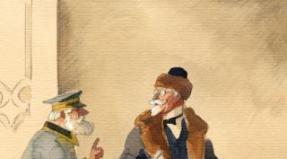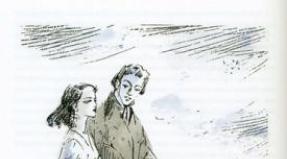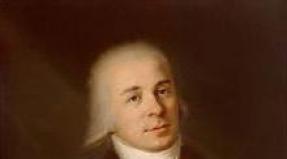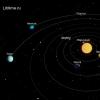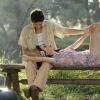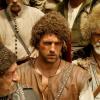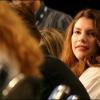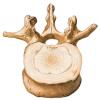And turgenev bezhin meadow. Ivan turgenev - bezhin meadow. Solar eclipse and Trishka
"Bezhin Meadow" is a story by I. S. Turgenev, included in the collection "Notes of a Hunter". During the creation period, he spent a lot of time in the village. His main interlocutors were hunters, who were very different from the rest of the villagers. It was these stories, as well as the amazing nature, that served as the inspiration for the creation of the "Hunter's Notes" cycle. The story "Bezhin Meadow" is a small work, replete with descriptions of beautiful and serene Russian landscapes.
The story begins with the fact that one warm July day the hunter is lost in the forest. For a long time he wanders along unknown paths, but he still cannot find his way home. Already completely desperate and almost falling into a cliff, the hunter suddenly notices a fire. Out of nowhere, two large dogs run out to meet him, barking, followed by the village boys. The hunter learns that the guys came at night to graze horses, as insects and heat haunt the animals during the day.

Modestly sitting under a bush next to a fire, the traveler pretends to be asleep, although in reality he is watching the boys. The hunter does not want to embarrass them, therefore he does not show that he sees and hears everything. The guys, having relaxed a little, resume the interrupted communication. Bezhin meadow rings and shimmers with their voices.
Characteristics of boys. Features of appearance
There are five guys at the fire: Fedya, Pavlusha, Vanya, Kostya and Ilyusha. Bezhin Meadow is the name of the place where they drove the horses to graze. Fedya is the oldest in appearance, he is about 14 years old. At first glance, the hunter understands that the boy is from a wealthy family, and that he came with the guys not because of need, but for fun. This is evident in his manner of communication, neat new clothes and delicate facial features.

The second boy is Pavlusha. His external unattractiveness hides an amazing strength of character. The boy immediately evokes great sympathy for the hunter. Despite the fact that he is only twelve years old, Paul behaves like the most adult. He calms the boys when something frightens them, discretion and courage can be traced in his every word. The story "Bezhin Meadow" is a work in which Turgenev describes with special love ordinary peasant children, each of whom represents the future of the country.

Ilyusha is the same age as Pavlusha. He has an unremarkable face, which bears the imprint of a painful concern for something. It is Ilyusha who tells the most stories, he is distinguished by his ability to convey the essence of what happened in a good and captivating manner. The work "Bezhin Meadow" consists of such stories. The characterization of the boys given in the story emphasizes the individuality of each narrator.

Kostya is a boy with attentive and sad eyes. His freckled face is adorned with huge black eyes, shining with an incomprehensible brilliance, as if he wants to say something important, but cannot. He is about ten years old.

The last boy, the youngest, Vanya. At first, the hunter does not even notice him, as the child lies, covered with matting over his head. This is a seven-year-old boy with curly hair. He does not tell a single story, but the author admires his childish purity of thinking.
Each of the guys is doing his own thing and at the same time conducting a conversation. Bezhin Meadow echoes them with silence. The boys are very interested in the stories of the hunter, so he tries with all his might to pretend that he is sleeping.
Brownie
Ilyusha is the first to start his story. He says that he heard the brownie when he and the guys stayed overnight on the roll after work. The spirit rustled, rustled over the heads of the guys, coughed and disappeared.
Mermaid
The next case that Kostya heard about from his father. Once Gavrila, a carpenter, went into the forest and met a beautiful mermaid there. For a long time she called Gavrila, but he did not give in. And when he felt that he had no strength left to resist, he overshadowed himself with the banner of the cross. The mermaid cried and said that he, too, would shed tears with her all his life. After that, no one saw the carpenter cheerful again. Turgenev ("Bezhin Meadow"), as it were, puts the boys' stories into one big story of a hunter.
Drowned
Ilyusha tells about the dog Yermil, who, returning home late, saw a small lamb on the grave of a drowned man. He took it for himself, but it turned out that it was the soul of the deceased who had infiltrated the animal.
Suddenly the dogs jump out of their seats and rush into the darkness. Pavlusha, without hesitation, runs after them to check what is the matter. It seems to him that the wolf has made its way too close to them. It turned out that this is not the case. The hunter involuntarily admired the boy, he was so handsome and courageous at that moment. With special love, Turgenev draws the image of Pavlusha. "Bezhin Meadow" is a story that, although it ends on a minor note, still praises the victory of good over evil.
Restless master
Ilyusha continues his story with rumors about the deceased master. Once his grandfather Trofim met him and asked what he was looking for. The deceased replied that he needed a tear-grass. This means that the master lived too little, he wanted to escape from the grave.
Vestibule
Further, Ilyusha talks about how you can meet those who are to die soon. Grandma Ulyana saw first the boy Ivashka, who soon afterwards drowned, and then herself. Bezhin Meadow evokes strange and sometimes scary images. The boys' stories are a testament to this.
Antichrist
Pavlusha picks up the conversation with his story about a solar eclipse. In their village there was a legend that at the moment when the sun closes in the sky, Trishka will come. This will be an unusual and crafty person who will begin to seduce all believing Christians with sin.
Goblin and water
Next in line is the story from Ilya. He tells how one village peasant was led by a goblin through the forest, and he barely fought off him. This story smoothly flows into the story of the merman. Once there was a girl named Akulina, she was very beautiful. After she was attacked by a water man, she became. Now Akulina walks all black, in torn clothes and laughs for no reason.
The waterman also destroys the local boy Vasya. His mother, anticipating trouble from the water, with great excitement lets him go to swim. However, it still cannot save him. The boy is drowning.
The fate of Pavlusha
At this time, Paul decides to go down to the river to collect water. He comes back excited. When asked by the guys, he replies that he heard Vasin's voice, that he called him to him. Boys are baptized, they say that this is a bad omen. It was not for nothing that Bezhin Meadow spoke to him. The characterization of the boys reveals each individual image, covertly drawing children.
Morning and returning home
Waking up early in the morning, the hunter decides that it is time to return home. He quietly gathers and walks over to the sleeping boys. Everyone is asleep, only Pavlusha raises his head and looks at him. The hunter nods his head to the boy and leaves. Bezhin Meadow says goodbye to him. The characterization of boys requires special attention. After finishing reading it is worth revising it again.
The story ends with the words that Paul subsequently perishes. The boy does not drown, as boys' stories predict him, he falls from his horse and is smashed to death.
Ivan Sergeevich Turgenev belongs to the galaxy of remarkable Russian writers of the 19th century, who received world recognition and love of readers during his lifetime. In his works, he poetically described pictures of Russian nature, the beauty of human feelings. The work of Ivan Sergeevich is a complex world of human psychology. With the story "Bezhin Meadow", the image of the children's world and child psychology was first introduced into Russian literature. With the appearance of this story, the theme of the world of Russian peasants expanded.
History of creation
Peasant children are drawn by the writer with tenderness and love, he notes their rich spiritual world, the ability to feel nature and its beauty. The writer aroused in readers love and respect for peasant children, made them think about their future destinies. The story itself is part of a large cycle under the general title "Notes of a Hunter". The cycle is notable for the fact that for the first time in Russian literature types of Russian peasants were brought to the scene, described with such sympathy and detail that Turgenev's contemporaries considered that a new class had appeared that was worthy of a literary description.
In 1843 I.S. Turgenev met the famous critic V.G. Belinsky, who inspired him to create "Notes of a Hunter". In 1845, Ivan Sergeevich decided to devote himself entirely to literature. He spent the summer in the village, devoting all his free time to hunting and communicating with the peasants and their children. For the first time, plans for the creation of a work were announced in August September 1850. Then, on the draft of the manuscript, notes appeared containing plans for writing a story. At the beginning of 1851, the story was written in St. Petersburg and in February was published in the Sovremennik magazine.
Analysis of the work
Plot

The story is told on behalf of the author, who loves to hunt. One day in July, while hunting for black grouses, he got lost and, walking towards the fire of a burning fire, went out into a huge meadow, which the locals called Bezhin. Five peasant boys were sitting by the fire. Having asked them to spend the night, the hunter lay down by the fire, watching the boys.

In the further narration, the author describes five characters: Vanya, Kostya, Ilya, Pavlusha and Fedor, their appearance, characters and stories of each of them. Turgenev has always been partial to spiritual and emotionally gifted people, sincere and honest. It is these people that he describes in his works. Most of them live hard, while they adhere to high moral principles, are very demanding of themselves and those around them.
Heroes and characteristics

With deep sympathy, the author describes five boys, each of whom has its own character, appearance, and its own characteristics. This is how the writer describes one of the five boys, Pavlusha. The boy is not very handsome, his face is wrong, but the author notices a strong character in his voice and look. His appearance speaks of the extreme poverty of the family, since all his clothes consisted of a simple shirt and patched trousers. It was he who was entrusted to watch over the stew in the pot. He talks knowledgeably about a fish splashing in the water and a star rolling from the sky.
It is clear from his actions and speech that he is the most courageous of all the guys. This boy evokes the greatest sympathy not only for the author, but also for the reader. With one twig, not being frightened, at night, he rode alone to the wolf. Pavlusha knows all animals and birds very well. He is brave and not afraid to accept. When he tells that it seemed to him what the water man called him, the cowardly Ilyusha says that this is a bad omen. But Paul replies to him that he does not believe in omens, but believes in fate, from which you cannot escape anywhere. At the end of the story, the author informs the reader that Pavlusha died after falling from his horse.

Next comes Fedya, a boy of fourteen “with beautiful and thin, slightly small features, curly blond hair, light eyes and a constant half-cheerful, half-scattered smile. He belonged, by all accounts, to a wealthy family and went out into the field not out of need, but just for fun. " He is the oldest among the guys. He behaves importantly, by right of the elder. Speaks patronizingly, as if fearing to drop his dignity.

The third boy, Ilyusha, was completely different. Also a simple peasant boy. He looks no more than twelve years old. His slight, elongated, hunch-nosed face had a constant expression of dull, painful solicitude. His lips were compressed and did not move, and his eyebrows were drawn together, as if he was squinting from the fire all the time. The boy is neat. As Turgenev describes his appearance, "the rope carefully tied his neat black scroll." He is only 12 years old, but he already works with his brother in a paper mill. We can conclude that the boy is hardworking and responsible. Ilyusha, as the author noted, knew well all the popular beliefs that Pavlik completely denied.

Kostya looked no more than 10 years old, his small freckled face was pointed, like a squirrel, huge black eyes stood out on him. He was also poorly dressed, thin, of a small sprout. He spoke in a thin voice. The author's attention is drawn to his sad, thoughtful look. He is a mute cowardly boy, but, nevertheless, he goes out with the boys every night to graze horses, sit by the night fire and listen to scary stories.

The most inconspicuous boy of all five is seven-year-old Vanya, who was lying near the fire, "quietly nestling under an angular mat, and only from time to time exposed his fair-haired curly head from under it." He is the youngest of all, the writer does not give him a portrait characterization. But all his actions, admiring the night sky, admiration for the stars, which he compares with bees, characterize him as an inquisitive, sensitive and very sincere person.

All the peasant children mentioned in the story are very close to nature, they literally live in unity with it. From early childhood, they already know what work is, independently learn the world around them. This is facilitated by work at home and in the field, and during field trips. Therefore, Turgenev describes them with such love and reverent attention. Such children are our future.
The writer's story does not belong only to the time of its creation, to the 19th century. This story is deeply modern and timely at all times. Today, more than ever, a return to nature is required, to the understanding that it is necessary to take care of it and live with it in unity, like a beloved mother, but not a stepmother. To educate our children on work and respect for it, on respect for the working person. Then the world around us will change, become cleaner and more beautiful.
Ivan Sergeevich Turgenev
RIDGE MEADOW
It was a beautiful July day, one of those days that only happens when the weather has settled for a long time. From the very early morning the sky is clear; the morning dawn is not ablaze with fire: it spreads with a gentle blush. The sun - not fiery, not incandescent, as during a sultry drought, not dull-purple, as before a storm, but bright and welcomingly radiant - peacefully rises under a narrow and long cloud, shines freshly and plunges into its purple fog. The upper, thin edge of the stretched cloud will sparkle with snakes; their shine is like the shine of forged silver ... But here again the playing rays gushed out - and a mighty luminary rises merrily and majestically, as if taking off. Around noon, a multitude of high, round clouds usually appear, golden gray with delicate white edges. Like islands scattered on an endlessly overflowing river, flowing around them with deeply transparent sleeves of even blue, they hardly budge; further, towards the sky, they move, crowded together, the blue between them can no longer be seen; but they themselves are as azure as the sky: they are all imbued with light and warmth through and through. The color of the sky, light, lavender, does not change all day and is the same all around; nowhere does it get dark, the thunderstorm does not thicken; except in some places bluish stripes stretch from top to bottom: then a barely noticeable rain is sown. By evening these clouds disappear; the last of them, blackish and vague like smoke, lay in pink clouds against the setting sun; in the place where it set as calmly as it calmly ascended into the sky, a scarlet radiance stands for a short time over the darkened earth, and, quietly blinking, like a candle carefully carried, the evening star will light up on it. On days like these, the colors are all softened; light, but not bright; everything bears the stamp of some kind of touching meekness. On such days the heat is sometimes very strong, sometimes even "soars" over the slopes of the fields; but the wind scatters, pushes the accumulated heat, and whirlwinds - an undoubted sign of constant weather - walk in tall white columns along the roads through the arable land. The dry and clean air smells of wormwood, squeezed rye, buckwheat; even an hour before the night, you do not feel dampness. A farmer wants such weather for harvesting bread ...
On such a day, I once hunted for black grouses in the Chernsky district, Tula province. I found and shot quite a lot of game; the filled game bag mercilessly cut my shoulder; but the evening dawn was already extinguished, and in the air, still bright, although no longer illuminated by the rays of the setting sun, cold shadows began to thicken and spread, when I finally decided to return to my home. With quick steps I walked a long "square" of bushes, climbed a hill and, instead of the expected familiar plain with an oak line to the right and a low white church in the distance, I saw completely different, unknown places. A narrow valley stretched at my feet; directly opposite, a frequent aspen forest rose up as a steep wall. I stopped in disbelief, looked around ... “Hey! - I thought, - yes, I did not get there at all: I took too much to the right, ”and, himself amazed at his mistake, he quickly descended the hill. An unpleasant, motionless dampness immediately seized me, as if I had entered a cellar; dense tall grass at the bottom of the valley, all wet, was white with an even tablecloth; walking on it was somehow creepy. I quickly scrambled to the other side and went, taking away to the left, along the aspen grove. Bats were already hovering over its sleeping tops, circling and trembling mysteriously in the dimly clear sky; A belated hawk flew briskly and straight overhead, hurrying to its nest. “As soon as I get to that corner,” I thought to myself, “there will be a road here now, but I gave a hook a mile away!”
I finally reached the corner of the forest, but there was no road there: some unmown, low bushes spread wide in front of me, and behind them, far, far away, was a deserted field. I stopped again. "What a parable? .. But where am I?" I began to remember how and where I went during the day ... “Eh! yes it is Parakhinskie bushes! - I exclaimed at last, - exactly! over there, it must be Sindeevskaya Grove ... But how did I get in here? So far away? .. Strange! Now we need to take the right again ”.
I went to the right through the bushes. Meanwhile, the night was approaching and growing like a thundercloud; darkness seemed to rise from everywhere with the evening vapors, and even from the heights. I came across some kind of uneven, overgrown path; I set off along it, looking carefully ahead. Everything around quickly turned black and subsided - some quails occasionally shouted. A small nocturnal bird, silently and low rushing on its soft wings, almost bumped into me and fearfully dived to the side. I went out to the edge of the bushes and wandered across the field. Already I could hardly distinguish distant objects; the field gleamed dimly around; behind him, approaching with every moment, a sullen gloom rose in huge clubs. My steps echoed dully in the frozen air. The pale sky began to turn blue again - but that was already the blue of the night. The stars flashed, stirred on it.
What I thought was a grove turned out to be a dark and round hillock. "But where am I?" - I repeated aloud again, stopped for the third time and looked inquiringly at my English yellow piebald dog Diana, decidedly the smartest of all four-legged creatures. But the smartest of the four-legged creatures just wagged her tail, blinked sadly with her tired eyes and did not give me any practical advice. I felt ashamed in front of her, and I desperately rushed forward, as if I suddenly guessed where I ought to go, rounded the hillock and found myself in a shallow, plowed hollow all around. A strange feeling seized me at once. This hollow looked like an almost regular cauldron with gentle sides; at the bottom of it stood upright several large, white stones - they seemed to have slipped there for a secret meeting - and before that it was dumb and dull, so flat, so sadly the sky hung over it, that my heart sank. Some animal weakly and pitifully squeaked between the stones. I hastened to get out back to the hillock. Until now, I still did not lose hope of finding my way home; but then I finally made sure that I had completely lost my way, and, already not at all trying to recognize the surrounding places, almost completely sunk in the gloom, I went straight for myself, by the stars - randomly ... For about half an hour I walked like this, moving my legs with difficulty. It seemed that I had never been in such empty places from my childhood: there was no light flickering anywhere, no sound was heard. One gentle hill gave way to another, the fields endlessly stretched after the fields, the bushes seemed to rise suddenly from the ground in front of my very nose. I kept walking and was about to lie down somewhere until morning, when suddenly I found myself above a terrible abyss.
I quickly drew back my raised leg and, through the barely transparent twilight of the night, I saw a huge plain far below me. The wide river skirted it in a semicircle leaving me; the steel reflections of the water, occasionally and dimly flickering, marked its flow. The hill on which I was, suddenly descended almost a sheer cliff; its huge outlines were separated, turning black, from the bluish airy emptiness, and right below me, in the corner formed by that precipice and plain, near the river, which in this place stood a motionless, dark mirror, under the very steep of the hill, each there are two lights next to my friend. People swarmed around them, shadows fluctuated, sometimes the front half of a small curly head was brightly illuminated ...
I finally found out where I had entered. This meadow is famous in our neighborhoods called Bezhina meadows ... But there was no way to return home, especially at night; my legs gave way under me from fatigue. I decided to go up to the lights and, in the company of those people whom I took for drovers, to wait for dawn. I went down safely, but did not have time to let go of the last branch I grabbed, when suddenly two large, white, shaggy dogs rushed at me with vicious barking. Children's ringing voices rang out around the lights; two or three boys quickly got up from the ground. I responded to their questioning cries. They ran up to me, recalled the dogs at once, which were especially struck by the appearance of my Dianka, and I went up to them.
I was mistaken in mistaking the people sitting around those lights for drovers. They were simply peasant children from neighboring villages who were guarding the herd. In the hot summer season, our horses are driven out at night to feed in the field: during the day, flies and gadflies would not give them rest. To drive the herd out before the evening and drive in the herd at dawn is a great holiday for peasant boys. Sitting without hats and wearing old sheepskin coats on the most lively nags, they rush with a merry whoop and shout, swinging their arms and legs, jumping high, laughing loudly. Light dust rises in a yellow column and rushes along the road; a friendly stomp is heard far away, the horses run, ears perked up; in front of everyone, his tail lifted and constantly changing legs, gallops some red cosmach, with a burdock in his tangled mane.
Bezhin meadow
(From the series "Notes of a Hunter")
It was a beautiful July day, one of those days that only happens when the weather has settled for a long time. From the very early morning the sky is clear; the morning dawn is not ablaze with fire: it spreads with a gentle blush. The sun - not fiery, not incandescent, as during a sultry drought, not dull-purple, as before a storm, but bright and welcomingly radiant - peacefully rises under a narrow and long cloud, shines freshly and plunges into its purple fog. The upper, thin edge of the stretched cloud will sparkle with snakes; their shine is like the shine of forged silver ... But here again the playing rays gushed out - and a mighty luminary rises merrily and majestically, as if taking off. Around noon, a multitude of high, round clouds usually appear, golden gray with delicate white edges. Like islands scattered on an endlessly overflowing river, flowing around them with deeply transparent sleeves of even blue, they hardly budge; further, towards the sky, they move, crowded together, the blue between them can no longer be seen; but they themselves are as azure as the sky: they are all imbued with light and warmth through and through. The color of the sky, light, lavender, does not change all day and is the same all around; nowhere does it get dark, the thunderstorm does not thicken; except in some places bluish stripes stretch from top to bottom: then a barely noticeable rain is sown. By evening these clouds disappear; the last of them, blackish and vague like smoke, lay in pink clouds against the setting sun; in the place where it set as calmly as it calmly ascended into the sky, a scarlet radiance stands for a short time over the darkened earth, and, quietly blinking, like a candle carefully carried, the evening star will light up on it. On days like these, the colors are all softened; light, but not bright; everything bears the stamp of some kind of touching meekness. On such days the heat is sometimes very strong, sometimes even "soars" over the slopes of the fields; but the wind scatters, pushes the accumulated heat, and whirlwinds - an undoubted sign of constant weather - walk in tall white columns along the roads through the arable land. The dry and clean air smells of wormwood, squeezed rye, buckwheat; even an hour before the night, you do not feel dampness. A farmer wants such weather for harvesting bread ...
On such a day, I once hunted for black grouses in the Chernsky district, Tula province. I found and shot quite a lot of game; the filled game bag mercilessly cut my shoulder; but the evening dawn was already extinguished, and in the air, still bright, although no longer illuminated by the rays of the setting sun, cold shadows began to thicken and spread, when I finally decided to return to my home. With quick steps I walked a long "square" of bushes, climbed a hill and, instead of the expected familiar plain with an oak line to the right and a low white church in the distance, I saw completely different, unknown places. A narrow valley stretched at my feet; directly opposite, a frequent aspen forest rose up as a steep wall. I stopped in bewilderment, looked around ... "Hey! - I thought, - but I did not get there at all: I took too much to the right," - and, himself amazed at my mistake, nimbly descended the hill. An unpleasant, motionless dampness immediately seized me, as if I had entered a cellar; dense tall grass at the bottom of the valley, all wet, was white with an even tablecloth; walking on it was somehow creepy. I quickly scrambled to the other side and went, taking away to the left, along the aspen grove. Bats were already hovering over its sleeping tops, circling and trembling mysteriously in the dimly clear sky; A belated hawk flew briskly and straight overhead, hurrying to its nest. "As soon as I get to that corner," I thought to myself, "there will be a road here now, but I gave a hook a mile away!"
I finally reached the corner of the forest, but there was no road there: some unmown, low bushes spread wide in front of me, and behind them, far, far away, was a deserted field. I stopped again. "What a parable? .. But where am I?" I began to remember how and where I went during the day ... "Eh! Yes, these are the Parakhinsky bushes!" far? .. Strange! Now you need to take the right again. "
I went to the right through the bushes. Meanwhile, the night was approaching and growing like a thundercloud; darkness seemed to rise from everywhere with the evening vapors, and even from the heights. I came across some kind of uneven, overgrown path; I set off along it, looking carefully ahead. Everything around quickly turned black and subsided - some quails occasionally shouted. A small nocturnal bird, silently and low rushing on its soft wings, almost bumped into me and fearfully dived to the side. I went out to the edge of the bushes and wandered across the field. Already I could hardly distinguish distant objects; the field gleamed dimly around; behind him, approaching with every moment, a sullen gloom rose in huge clubs. My steps echoed dully in the frozen air. The pale sky began to turn blue again - but that was already the blue of the night. The stars flashed, stirred on it.
What I thought was a grove turned out to be a dark and round hillock. "Where am I?" - I repeated aloud again, stopped for the third time and looked inquiringly at my English yellow piebald dog Diana, decidedly the smartest of all four-legged creatures. But the smartest of the four-legged creatures just wagged her tail, blinked sadly with her tired eyes and did not give me any practical advice. I felt ashamed in front of her, and I desperately rushed forward, as if I suddenly guessed where I ought to go, rounded the hillock and found myself in a shallow, plowed hollow all around. A strange feeling seized me at once. This hollow looked like an almost regular cauldron with gentle sides; at the bottom of it stood upright several large, white stones - they seemed to have slipped there for a secret meeting - and before that it was dumb and dull, so flat, so sadly the sky hung over it, that my heart sank. Some animal weakly and pitifully squeaked between the stones. I hastened to get out back to the hillock. Until now, I still did not lose hope of finding my way home; but then I was finally convinced that I had completely lost my way, and, no longer at all trying to recognize the surrounding places, almost completely sunk in the gloom, I went straight for myself, by the stars - at random ... For about half an hour I walked like this, moving my legs with difficulty. It seemed that I had never been in such empty places from my childhood: there was no light flickering anywhere, no sound was heard. One gentle hill gave way to another, the fields endlessly stretched after the fields, the bushes seemed to rise suddenly from the ground in front of my very nose. I kept walking and was about to lie down somewhere until morning, when suddenly I found myself above a terrible abyss.
I quickly drew back my raised leg and, through the barely transparent twilight of the night, I saw a huge plain far below me. The wide river skirted it in a semicircle leaving me; the steel reflections of the water, occasionally and dimly flickering, marked its flow. The hill on which I was, suddenly descended almost a sheer cliff; its huge outlines were separated, turning black, from the bluish airy emptiness, and right below me, in the corner formed by that precipice and plain, near the river, which in this place stood a motionless, dark mirror, under the very steep of the hill, each there are two lights next to my friend. People swarmed around them, shadows fluctuated, sometimes the front half of the small curly head was brightly illuminated ...
I finally found out where I had entered. This meadow is famous in our neighborhoods called Bezhina meadows ... But there was no way to return home, especially at night; my legs gave way under me from fatigue. I decided to go up to the lights and, in the company of those people whom I took for drovers, to wait for dawn. I went down safely, but did not have time to let go of the last branch I grabbed, when suddenly two large, white, shaggy dogs rushed at me with vicious barking. Children's ringing voices rang out around the lights; two or three boys quickly got up from the ground. I responded to their questioning cries. They ran up to me, recalled the dogs at once, which were especially struck by the appearance of my Dianka, and I went up to them.
I was mistaken in mistaking the people sitting around those lights for drovers. They were simply peasant children from neighboring villages who were guarding the herd. In the hot summer season, our horses are driven out at night to feed in the field: during the day, flies and gadflies would not give them rest. To drive the herd out before the evening and drive in the herd in the morning is a great holiday for peasant boys. Sitting without hats and wearing old sheepskin coats on the most lively nags, they rush with a merry whoop and shout, swinging their arms and legs, jumping high, laughing loudly. Light dust rises in a yellow column and rushes along the road; a friendly stomp is heard far away, the horses run, ears perked up; in front of everyone, his tail lifted and constantly changing legs, gallops some red cosmach, with a burdock in his tangled mane.
I told the boys that I was lost and sat down with them. They asked me where I was from, were silent, stepped aside. We talked a little. I lay down under the gnawed bush and began to look around. The picture was wonderful: near the lights a round reddish reflection trembled and seemed to freeze, resting against the darkness; the flames, flaring up, occasionally cast rapid reflections beyond the line of that circle; a thin tongue of light will lick the bare branches of the vine and disappear at once; sharp, long shadows, bursting in for a moment, in turn, ran to the very lights: darkness fought with light. Sometimes, when the flame burned weaker and the circle of light narrowed, a horse's head, bay, with a winding groove, or all white, would suddenly appear out of the approaching darkness, attentively and stupidly looked at us, deftly chewing on the long grass, and, again descending, immediately disappeared. You could only hear how she continued to chew and sniff. From the illuminated place it is difficult to see what is happening in the darkness, and therefore everything seemed to be drawn up close by an almost black curtain; but further to the sky hills and forests were dimly visible in long patches. The dark clear sky solemnly and immensely high stood above us with all its mysterious splendor. My chest was sweetly shy, inhaling that special, languid and fresh smell - the smell of a Russian summer night. There was almost no noise around ... Only occasionally a large fish would splash with sudden sonority in a nearby river and the coastal reed would faintly rustle, barely shaken by the oncoming wave ... Some lights crackled quietly.
The boys sat around them; there and then sat those two dogs, which so wanted to eat me. For a long time they could not come to terms with my presence and, squinting sleepily and looking sideways at the fire, occasionally growled with an extraordinary sense of their own dignity; at first they growled, and then they squealed slightly, as if regretting the impossibility of fulfilling their desire. There were five boys in total: Fedya, Pavlusha, Ilyusha, Kostya and Vanya. (From their conversations, I learned their names and intend now to introduce them to the reader.)
The first, eldest of all, Fedya, you would have given fourteen years. He was a slender boy, with beautiful and thin, slightly small features, curly blond hair, light eyes and a constant half-cheerful, half-absent-minded smile. He belonged, by all accounts, to a wealthy family and went out into the field not out of need, but just for fun. He wore a motley chintz shirt with a yellow border; a small new army jacket, put on a saddle, barely held on to his narrow shoulders; a comb hung from a blue belt. His boots with low tops were like his boots - not his father's. The second boy, Pavlusha, had tousled hair, black, gray eyes, wide cheekbones, a pale, pockmarked face, a large, but regular mouth, a huge head, as they say, with a beer cauldron, a squat body, clumsy. The fellow was unsightly - to be sure! - but nevertheless I liked him: he looked very intelligently and directly, and in his voice there sounded strength. He could not flaunt his clothes: it all consisted of a simple manly shirt and patched ports. The face of the third, Ilyusha, was rather insignificant: hunchbacked, elongated, half-blind, it expressed a kind of dull, painful solicitude; his compressed lips did not move, his knitted eyebrows did not part - he seemed to be squinting at the fire. His yellow, almost white hair protruded in sharp braids from under a low felt hat, which he now and then pulled over his ears with both hands. He was wearing new bast shoes and onuchi; a thick rope, twisted three times around the camp, carefully tied his neat black scroll. Both he and Pavlusha looked no more than twelve years old. The fourth, Kostya, a boy of about ten, aroused my curiosity with his pensive and sad look. His whole face was small, thin, freckled, pointed downwards, like a squirrel; lips could hardly be distinguished; but a strange impression was produced by his large, black, liquid glittering eyes: they seemed to want to say something, for which there were no words in his language - in his language at least. He was short, frail, and rather poorly dressed. At first I didn't even notice the latter, Vanya: he was lying on the ground, quietly nestling under an angular mat, and only from time to time put his fair-haired curly head out from under it. This boy was only seven years old.
So, I lay on the side under a bush and looked at the boys. A small pot hung over one of the lights; "potatoes" were cooked in it, Pavlusha watched him and, on his knees, poked a chip into the boiling water. Fyodor lay propped on his elbow and spread the flaps of his army jacket. Ilyusha was sitting next to Kostya and still squinting his eyes tensely. Kostya lowered his head a little and looked somewhere into the distance. Vanya did not move under his mat. I pretended to be asleep. Little by little the boys started talking again.
At first they chatted about this and that, about tomorrow's work, about horses; but suddenly Fedya turned to Ilyusha and, as if resuming an interrupted conversation, asked him:
- Well, and what have you seen the brownie?
“No, I didn’t see him, and I’m not even able to see him,” Ilyusha answered in a hoarse and weak voice, the sound of which matched his expression as best as possible, “but I heard ... And I’m not alone.
- And where is he found? - asked Pavlusha.
- In the old roll.
- Do you go to a factory?
- Why, we go. My brother and I, with Avdyushka, are in the foxes.
- See you - factory! ..
- Well, how did you hear him? - asked Fedya.
- That's how. We had it with my brother Avdyushka, and with Fyodor Mikheevsky, and with Ivashka the Kosy, and with the other Ivashka from Krasnye Holmy, and even with Ivashka Sukhorukov, and there were also other kids there; there were all of us guys about ten - as is the whole shift; but we had to spend the night in a roll, that is, not that we had to, but Nazarov, the overseer, forbade; says: "What, they say, you guys have to drag home; tomorrow there is a lot of work, so you guys don't go home." So we stayed and lay all together, and Avdyushka began to say that, they say, guys, well, how will the brownie come? .. And before he, Avdey, had time to speak, suddenly someone came over our heads; but we were lying at the bottom, and he came at the top, at the wheel. We hear: he walks, the boards under him bend and crack; here he passed through our heads; the water will suddenly make a noise on the wheel, make a noise; knock, knock the wheel, spin; but the screensavers at the palace have been lowered. We marvel: who raised them, that the water went; however, the wheel turned, turned, and it did. He went again to the door upstairs and began to go down the stairs, and he obeyed that way, as if he was in no hurry; the steps under him even groan ... Well, he came to our door, waited, waited - the door suddenly swung open all of a sudden. We got excited, we look - nothing ... Suddenly, lo and behold, at one vat the form began to stir, rose, plunged, walked, walked that way through the air, as if someone was rinsing it, and again into place. Then at another vat the hook was removed from the nail and again onto the nail; then it was as if someone had gone to the door, and suddenly he coughs, he coughs up like a sheep, and so loudly ... We all fell down like a heap, we crawled under each other ...
- See how! - said Pavel. - Why did he cough?
- I do not know; maybe from dampness.
They were all silent.
- And what, - asked Fedya, - have the potatoes been boiled?
Pavlusha felt them.
- No, more cheese ... See, splashed it, - he added, turning his face in the direction of the river, - it must have been a pike ... And over there the star rolled.
“No, I’ll tell you what, brothers,” said Kostya in a thin voice, “listen, just the other day what my aunt was telling me.
“Well, let's listen,” Fedya said with a patronizing air.
- You know Gavrila, the suburban carpenter?
- Well, yes; we know.
- Do you know why he is so unhappy, everything is silent, you know? That's why he is so unhappy. He went once, my friend said, - he went, my brothers, into the forest, peeling nuts. So he went nuts into the forest, and he got lost; went in - God knows where he went. He walked, walked, my brothers - no! cannot find a road; and the night is in the yard. So he sat down under a tree; Come on, they say, I'll wait for the morning, - sat down and dozed off. So he fell asleep and suddenly hears someone calling him. Looks - no one. He fell asleep again - again called. He looks again, looks: and in front of him on a branch a mermaid sits, sways and calls him to her, and she dies with laughter, laughs ... And the month shines strongly, so strongly, clearly the month shines - that's all, my brothers, it is seen. So she calls him, and she is all very light, white sits on a branch, like some kind of carp or a gudgeon - and then another crucian carp can be so whitish, silver ... Gavrila, the carpenter has died, my brothers, but she knows he laughs and keeps calling him to her. Gavrila was about to get up, listened to the mermaids, my brothers, yes, to know, the Lord advised him: he put the cross on himself ... And how difficult it was for him to lay the cross, my brothers; says, the hand is just like a stone, does not turn ... Oh, you are so, but! .. That's how he laid the cross, my brothers, the little mermaid stopped laughing, but suddenly she starts crying ... She cries, my brothers, eyes wipes her hair, and her hair is green, like your hemp. So Gavrila looked, looked at her, and began to ask her: "What are you, forest potion, crying for?" And the mermaid would say to him: "You shouldn't be baptized, he says, man, you should live with me in joy until the end of your days; but I cry, I am killed because you were baptized; you until the end of days. " Then, my brothers, she disappeared, and Gavrila immediately and understood how he could get out of the forest, that is, to get out ... And only since then he has been walking around unhappy.
- Eka! - said Fedya after a short silence, - but how can this kind of forest evil spirits a Christian soul, - he didn't listen to her?
- Yes, there you go! - said Kostya. - And Gavrila said that her voice, they say, is so thin, plaintive, like that of a toad.
- Did your dad tell it himself? - continued Fedya.
- Myself. I was lying on the bed, I heard everything.
- Wonderful business! Why should he be sad? .. And, know, she liked him, that she called him.
- Yes, I liked it! - picked up Ilyusha. - How! She wanted to tickle him, that's what she wanted. This is their business, these mermaids.
- But here and there should be mermaids, - said Fedya.
- No, - answered Kostya, - here the place is clean, free. One - the river is close.
All were silent. Suddenly, somewhere in the distance, there was a prolonged, ringing, almost groaning sound, one of those incomprehensible nocturnal sounds that sometimes arise in the midst of deep silence, rise, stand in the air and slowly spread at last, as if fading away. If you listen, it’s as if there’s nothing, but it rings. It seemed that someone had shouted for a long, long time under the very horizon, someone else seemed to have responded to him in the forest with a thin, sharp laugh, and a weak, hissing whistle rushed along the river. The boys looked at each other, shuddered ...
- The power of the cross is with us! - Ilya whispered.
- Eh you, crows! - Pavel shouted. - Why are you in a flurry? Look, the potatoes are boiled. (Everyone moved up to the pot and began eating steaming potatoes; Vanya alone did not move.) What are you? - Pavel said.
But he did not crawl out from under his mat. The pot was soon empty.
- Did you guys hear, - Ilyusha began, - what happened the other day at Barnavitsy?
- At the dam? - asked Fedya.
- Yes, yes, on the dam, on the broken one. This is a really unclean place, so unclean, and such a deaf place. All around there are such gullies, ravines, and in ravines all kazyuli are found.
- Well, what happened? say ...
- Here's what happened. You, perhaps, Fedya, do not know, but only there is a drowned man buried there; and he drowned himself long ago, as the pond was still deep; only his grave is still visible, and even that one is barely visible: so - a bump ... Here, the other day, the clerk is calling the kennel Yermil; says: "Go, they say, Yermil, to the post." Ermil always goes to the post office with us; He has pissed off all his dogs: for some reason, they don't live with him, they never lived, but he is a good huntsman, he took everyone. Here Yermil went for the post, and he hesitated in the city, but he was already drunk on the way back. And the night, and the bright night: the moon is shining ... So Yermil goes through the dam: this is his way out. He goes that way, the huntsman Yermil, and sees: the drowned man has a lamb on the grave, such a white, curly, pretty, walking around. So Yermil thinks: "I will take him, - why should he be so lost", and even got down, and took him in his arms ... But the lamb - nothing. Here Yermil goes to the horse, and the horse stares from him, snores, shakes his head; however, he spun it off, sat on it with a lamb, and rode off again, holding the lamb in front of him. He looks at him, and the lamb looks straight into his eyes. He felt terrified, I’m a hound for Yermil: why don’t I remember that the rams would look someone in the eye like that; however nothing; he began to stroke it that way on the wool, - says: "Byasha, byasha!" And the ram suddenly bares its teeth, and he too: "Byasha, byasha ..."
Before the narrator had time to utter this last word, suddenly both dogs rose at once, with convulsive barking rushed away from the fire and disappeared into the darkness. All the boys were scared. Vanya jumped out from under his mat. Pavlusha, screaming, rushed after the dogs. Their barking quickly moved away ... The restless running of the alarmed herd was heard. Pavlusha shouted loudly: "Gray! Beetle! .." A few moments later the barking stopped; Paul's voice came from afar ... A little more time passed; the boys looked at each other in bewilderment, as if waiting for something to happen ... Suddenly there was the sound of a galloping horse; She stopped abruptly near the fire, and, clinging to the mane, Pavlusha quickly jumped off her. Both dogs also jumped into the circle of light and immediately sat down, sticking out their red tongues.
- What is there? what? The boys asked.
“Nothing,” Pavel answered, waving his hand at the horse, “so the dogs have sensed something. I thought it was a wolf, ”he added in an indifferent voice, nimbly breathing with all his chest.
I could not help admiring Pavlusha. He was very good at that moment. His ugly face, animated by a fast ride, burned with bold prowess and firm determination. Without a twig in his hand, at night, he, without hesitation, galloped one on the wolf ... "What a fine boy!" - I thought, looking at him.
- Have you seen them, perhaps, wolves? - asked the coward Kostya.
“There are always a lot of them here,” Pavel answered, “but they are restless only in winter.
He took a nap again in front of the fire. Sitting on the ground, he disfigured his hand on the shaggy back of the head of one of the dogs, and for a long time the delighted animal did not turn its head, looking with grateful pride from the side at Pavlusha.
Vanya again huddled under the mat.
“And what fears did you tell us, Ilyushka,” said Fedya, who, like the son of a rich peasant, had to be the lead singer (he himself spoke little, as if afraid to drop his dignity). - Yes, and the dogs here are not easy pulled to bark ... And exactly, I heard that this place you have unclean.
- Barnabis? .. Of course! how unclean! They say they have seen the old master there more than once — the deceased master. They say he walks in a longcoat and all this is groaning like that, looking for something on earth. Once grandfather Trofimych met him: "What, they say, father, Ivan Ivanovich, would you please to look for on the ground?"
- Did he ask him? - interrupted the astonished Fedya.
- Yes, I asked.
- Well, well done after that Trofimych ... Well, and what then?
- Rip-grass, he says, I'm looking. - Yes, he says so dully, dully: - Rip-grass. - And what do you need, Father Ivan Ivanovich, a tear-grass? - He's pressing, he says, the grave is pressing, Trofimych: out I want it, out ...
- See what! - noticed Fedya, - it is not enough, to know, he lived.
- What a miracle! - said Kostya. - I thought the dead could only be seen on parental Saturday.
- You can see the dead at any hour, - Ilyusha picked up with confidence, who, as far as I could see, knew all rural beliefs better than others ... year's turn to die. One has only to sit on the church porch at night and look at the road all the time. Those will pass you on the road, who, that is, die that year. Last year, our grandmother Ulyana went to the porch.
- Well, has she seen anyone? - asked Kostya curiously.
- How. First of all, she sat for a long, long time, saw no one and did not hear ... only everything seemed to be barking like a dog, barking somewhere ... Suddenly, she looked: a boy in one shirt was walking along the path. She liked it - Ivashka Fedoseev is coming ...
- The one who died in the spring? - Fedya interrupted.
- The same one. She walks and does not raise her head ... But Ulyana recognized him ... But then she looks: the woman is walking. She peer, peer, - oh you, Lord! - she is walking along the road, Ulyana herself.
- Really herself? - asked Fedya.
- By God, herself.
“Well, she’s not dead yet?”
- Yes, a year has not yet passed. And you look at her: what keeps the soul.
Everyone was quiet again. Pavel threw a handful of dry twigs on the fire. Sharply they turned black on the suddenly flared flame, crackled, smoked and went to warp, lifting the burnt ends. The reflection of the light struck, trembling violently, in all directions, especially upward. Suddenly, out of nowhere, a white dove flew right into this reflection, fearfully turned in one place, all covered with a hot shine, and disappeared, ringing its wings.
- You know, he got out of the house, - Pavel remarked. - Now he will fly, as long as he stumbles upon anything, and where he pokes, there he spends the night until dawn.
- And what, Pavlusha, - said Kostya, - wasn't this righteous soul flying to heaven, eh?
Paul threw another handful of twigs into the fire.
“Maybe,” he said finally.
- And tell, perhaps, Pavlusha, - began Fedya, - that you, too, in Shalamov had a vision of heavenly foresight?
- How can you see the sun? How is it.
- Tea, are you scared too?
- Yes, we are not alone. Our master, khosh, told us beforehand that, they say, there will be a foresight for you, but when it got dark, he himself, they say, got so frightened that on-go. And in the courtyard hut the woman cook, as soon as it got dark, hey, she took and gripped all the pots in the oven: "Who is there now, he says, has come to light." So the coolness began to flow. And in our village, brother, there were rumors that, they say, white wolves would run on the ground, there would be people, a bird of prey would fly, or even Trishka himself would be seen.
- What kind of Trishka is this? - asked Kostya.
- Do not you know? - Ilyusha intercepted with fervor. - Well, brother, are you an otkenteleva that you don’t know Trishka? Sydney is sitting in your village, that's for sure Sydney! Trishka - evto will be such an amazing person who will come; and he will come when the last times come. And he will be such an amazing person that it will not be possible to take him, and he will not be able to do anything: he will be such an amazing person. The peasants will want it, for example; They would come out on him with a cudgel, cordon him off, but he would avert their eyes - he would avert their eyes so that they themselves would beat each other. They will put him in prison, for example, - he will ask him to drink some water in a ladle: they will bring him a ladle, and he will dive in there, and remember what his name was. They will put the chains on him, and he will tremble in his palms - they just fall off him. Well, this Trishka will walk in villages and towns; and this Trishka, a crafty man, will seduce the people of the Chrestian ... well, but he will not be able to do anything ... He will be such an amazing, crafty person.
- Well, yes, - Pavel continued in his unhurried voice, - such. Here they were waiting for him. The old people said that, they say, as soon as the heavenly foresight is conceived, Trishka will come. So foresight was conceived. He poured all the people out into the street, in the field, waiting for what would happen. And here, you know, the place is prominent, free. They looked - suddenly a man, so tricky, with such an amazing head, was walking down the mountain from the settlement ... Everyone shouted: "Oh, Trishka is coming! Oh, Trishka is coming!" - who where! Our elder climbed into the ditch; the old woman got stuck in the doorway, screaming with a good obscenity, she was so intimidated by her door dog that she was off the chain, but through the fence, and into the forest; and Kuz'kin's father, Dorofeich, jumped into the oats, sat down, and let’s shout like a quail: "Perhaps, they say, at least the enemy, the murderer, will regret the bird." This is how everyone was alarmed! .. And the man was our bochard, Vavila: he bought himself a new jug and put an empty jug on his head and put it on.
All the boys laughed and fell silent again for a moment, as often happens with people talking in the open air. I looked around: the night was solemn and regal; the damp freshness of the late evening was replaced by a dry midnight warmth, and for a long time she had to lie in a soft canopy on the fields asleep; there was still a lot of time left until the first babble, before the first rustles and rustles of the morning, before the first dewdrops of dawn. The moon was not in the sky: it rose late at that time. Countless golden stars, it seemed, were quietly flowing, all twinkling in vain, in the direction of the Milky Way, and, right, looking at them, you seemed to vaguely feel the impetuous, non-stop running of the earth ...
A strange, sharp, painful cry suddenly rang out twice in a row over the river and, after a few moments, was repeated further on ...
Kostya shuddered. "What is it?"
“It’s a heron screaming,” Pavel objected calmly.
- Tsaplya, - repeated Kostya ... - And what is it, Pavlusha, I heard yesterday evening, - he added, after a pause, - you, perhaps, know ...
- What did you hear?
- Here's what I heard. I walked from the Stone Ridge to Shashkino; and at first he walked with our hazel trees, and then he walked in a meadow - you know, where he goes out with a drift - there is booze; you know, it's still overgrown with reeds; So I walked past this, my brothers, and suddenly from this I was moaning as someone groaned, but so pityingly, pityingly: oo ... oo ... oo ... oo! Such fear took me, my brothers: the time is late, and the voice is so sick. So, it seems, he himself would have cried ... What would it be? eh?
- In this buchil in the last summer the Akim-forester was drowned by thieves, - Pavlusha remarked, - so, maybe his soul is complaining.
“But even then, my brothers,” objected Kostya, widening his already huge eyes ... “I didn’t know that Akim was drowned in that boochil: I wouldn’t be so scared.
- And then, they say, there are such tiny frogs, - Pavel continued, - which cry so pitifully.
- Frogs? Well, no, these are not frogs ... what are they ... (The heron shouted again over the river.) Eck her! - Kostya said involuntarily, - like a goblin shouts.
- Goblin does not shout, he is dumb, - Ilyusha picked up, - he only claps and cracks his hands ...
- Have you seen him, devil, or what? - Fedya interrupted him mockingly.
- No, I have not, and God forbid to see him; but others saw. The other day he walked around the peasant with us: he took him, took him through the forest, and everything around one glade ... He barely got home to the light.
- Well, did he see him?
- Saw. He says that he is standing big, big, dark, shrouded, as if behind a tree, you can't really tell, as if he is hiding from the moon, and looks, looks with eyes, blinks them, blinks ...
- Oh you! - Fyodor exclaimed, slightly shuddering and shrugging his shoulders, - pfu! ..
- And why did this trash in the world get divorced? - Pavel remarked. - I don't understand, really!
- Do not swear, look, he will hear, - said Ilya.
There was silence again.
- Look, look, guys, - Vanya's childish voice suddenly rang out, - look at God's stars, - that the bees are swarming!
He pushed his fresh face out from under the mat, leaned on his fist, and slowly raised his large, quiet eyes. The eyes of all the boys went up to the sky and did not fall quickly.
- And what, Vanya, - said Fedya affectionately, - is your sister Anyutka healthy?
- Well, - answered Vanya, slightly bursting.
- You tell her - that she is here, why doesn't she come? ..
- I do not know.
- You tell her to go.
- I'll tell you.
- You tell her that I will give her a present.
- Will you give it to me?
- I'll give it to you too.
Vanya sighed.
“Well, no, I don’t need it. Better give her: she is so kind with us.
And Vanya again put his head on the ground. Pavel got up and took the empty pot in his hand.
- Where are you going? - Fedya asked him.
- To the river, to scoop up some water: I wanted to drink some water.
The dogs got up and followed him.
- Don't fall into the river! - Ilyusha shouted after him.
- Why should he fall? - said Fedya, - he will be careful.
- Yes, beware. Anything can happen: he just bends down, starts scooping up water, and the water one will grab him by the hand and drag him to him. Then they will say: he fell, they say, a small man in the water ... And what fell?
The reeds exactly, moving apart, "rustled", as we say.
- Is it true, - asked Kostya, - that Akulina is a fool since then and has gone crazy, as she was in the water?
- Since then ... What is it now! But they say, before the beauty was. The waterman spoiled it. Know, did not expect that she would be pulled out soon. Here he is, there at his bottom, and spoiled it.
(I myself have met this Akulina more than once. Covered in rags, terribly thin, with a face as black as coal, dim eyes and always bared teeth, she tramples for hours in one place, somewhere on the road, firmly pressing her bony hands to chest and slowly waddling from foot to foot, like a wild animal in a cage. She does not understand anything, no matter what they say to her, and only occasionally laughs convulsively.)
- And they say, - went on Kostya, - Akulina threw herself into the river because her lover deceived.
- From that one.
- Do you remember Vasya? Kostya added sadly.
- What Vasya? - asked Fedya.
- But the one that drowned, - answered Kostya, - in this one in the river itself. What a boy he was! and-them, what a boy he was! His mother, Feklista, how she loved him, Vasya! And as if she sensed, Fekliste, that he would die from the water. It used to go, from Vasya, with us, with the children, to swim in the river in the summer - she would start to tremble all over. Other women are okay, they walk past themselves with troughs, waddle, and Feklista will put the trough on the ground and begin to call him: "Come back, they say, come back, my light! Oh, come back, falcon!" And how he drowned. God knows. He played on the bank, and his mother was there and then, raking up the hay; suddenly he hears, as if someone is blowing bubbles in the water - lo and behold, but only Vasina's little cap is floating in the water. After all, since then, Feklista has been out of his mind: he will come and lie down in the place where he is drowned; he will lie down, my brothers, and he will drag on the song - remember, Vasya sang this song all the time, - so she will drag it on, but she herself cries, cries, bitterly complains to God ...
“But Pavlusha is coming,” said Fedya.
Pavel walked over to the fire with a full pot in his hand.
- What, guys, - he began, after a pause, - the matter is not right.
- And what? - Kostya asked hastily.
- I heard Vasya's voice.
Everyone shuddered.
- What are you, what are you? - Kostya stammered.
- By God. As soon as I began to bend over to the water, I suddenly heard calling me that way in Vasya's voice and as if from under the water: "Pavlusha, and Pavlusha!" I'm listening to; and he again calls: "Pavlusha, come here." I walked away. However, he scooped up the water.
- Oh you, Lord! oh you, Lord! - said the boys, crossing themselves.
- After all, it was the waterman who called you, Pavel, - added Fedya ... - And we were just talking about him, about Vasya.
“Ah, this is a bad omen,” Ilyusha said in a deliberate manner.
- Well, nothing, let it go! - said Pavel resolutely and sat down again, - you cannot escape your fate.
The boys quieted down. It was evident that Paul's words made a deep impression on them. They began to lay down in front of the fire, as if about to sleep.
- What is it? - asked Kostya suddenly, raising his head.
Pavel listened.
- These are little kulichs flying, whistling.
- Where are they going?
- And where, they say, there is no winter.
- Is there such a land?
- There is.
- Far?
- Far, far, beyond the warm seas.
Kostya sighed and closed his eyes.
More than three hours have passed since I joined the boys. The moon has risen at last; I bowed to the dark edge of the earth, many stars did not immediately notice: it was so small and narrow. This moonless night, it seemed, was still as magnificent as before ... But already, not long ago, they were standing high in the sky; everything was completely quiet around, as usually everything calms down only towards morning: everything was asleep in a sound, motionless, before dawn sleep. The air no longer smelled so strongly - it was as if dampness was spreading in it again ... Summer nights were short! .. The boys' conversation faded away along with the lights ... The dogs even dozed; the horses, as far as I could discern, in the slightly dawning, faintly pouring light of the stars, also lay with their heads bowed ... A sweet oblivion attacked me; it passed into slumber.
A fresh stream ran through my linden. I opened my eyes: the morning was beginning. The dawn has not yet turned red anywhere, but it has already turned white in the east. Everything became visible, although dimly visible, all around. The pale gray sky was brightening, colder, blue; the stars first blinked with a faint light, then disappeared; the earth was damp, the leaves fogged up, here and there live sounds, voices began to be heard, and the liquid, early breeze had already begun to wander and flutter over the earth. My body responded to him with a light, cheerful tremor. I got up nimbly and walked over to the boys. They all slept like dead around a smoldering fire; Pavel alone raised himself up to half and looked intently at me.
I nodded my head to him and went home along the smoke-filled river. Before I had time to move two miles away, they already poured all around me over a wide wet meadow, and in front, along green hills, from forest to forest, and behind along a long dusty road, along sparkling, stained bushes, and along the river, shyly blue from - under the thinning fog, - first scarlet, then red, golden streams of young, hot light poured down ... Everything stirred, woke up, began to sing, rustled, began to speak. Everywhere large drops of dew blazed like radiant diamonds; To meet me, clean and clear, as if also washed by the morning coolness, came the sound of a bell, and suddenly a rested herd rushed past me, chased by familiar boys ...
Unfortunately, I must add that in the same year Paul died. He did not drown: he was killed by falling from a horse. It's a pity he was a nice guy!
The work "Bezhin Meadow" is included in the famous cycle of stories "Notes of a Hunter", which first began to be published in the journal "Sovremennik" in 1847. Turgenev showed the public the peasant class in a new light, forcing readers to voluntarily reflect on the fate of these ordinary people. The name of the cycle itself reveals in detail the content of all the works that make up it, but at the same time the semantic load of each of them deserves special attention.
The impetus for the creation of "Notes of a Hunter" was for Turgenev his acquaintance with the literary critic VG Belinsky. He inspired Ivan Sergeevich to this work, which later became the starting point in involving readers in the life of the peasants and their everyday life.
Spending the summer in the village, Turgenev himself penetrated deeper into the way of life of ordinary people, observed and took notes. "Bezhin Meadow", in particular, with the words of the author, reveals the personality, characters and thinking of peasant children.
At first, Turgenev, devoting all his free time to communicating with the peasants and their children, along the way created a draft of his observations, periodically making many amendments and additions. And in 1851 the story was completed and published in full in Sovremennik.
Genre, direction
The cycle "Notes of a Hunter" is a collection of stories, and the genre of this work, respectively, is a story, whose narrative character, according to the literary definition, reveals a specific episode.
It would seem that I.S.Turgenev is a bright representative of realism in the literature of the 19th century. However, in his story "Bezhin Meadow" notes of romanticism can be traced. The feelings of the main characters are inextricably linked with the description of nature, they constantly overlap. Moreover, some natural phenomena have a clear fabulous subtext, perhaps based on myths, nevertheless, when reading, there is an alarming escalation of the atmosphere around. This state borders on the soulfulness of the author's presentation of his memoirs. This is expressed through the description of the appearance of the main characters. Thus, the features of poetry appear in the story.
The essence
The story is told on behalf of the author, and this is what he is talking about: the narrator, having gone hunting with his dog, got lost in the forest. Wandering before dark, he found himself at a ravine, under which he could see the plain. In those places it was known as Bezhin Meadow. Through the twilight of the night, the hunter noticed on him several people swarming around the fires. Going down to them, I realized that these were peasant boys of different ages, there were five of them in total. The guys guarded the herd of horses at night. The author asked to spend the night with them in the field, reporting that he had lost his way. The boys were at first wary of the night guest, but talked a little with him, and after that they sat by the fire and were silent for a while. They had two large dogs with them.
The author lay down under a bush a little further from the children and, until he fell asleep, watched them. The boys took turns telling each other old village tales and legends, emotionally sharing their experiences in this regard. Some of the stories from their lips sounded rather frightening and ominous. And the words of one of them that everything in everyone's life is predetermined, and no one will escape his fate, hung like a heavy load in the warm night air, forcing the heroes to fall silent and think for a while.
The guys told each other amazing stories about the brownie, the goblin and the watery, recalling the tragic ending of some of them. As a result, a sad outcome befell one of the boys: in the same year he died, falling from a horse. We learn about this from the author, when he had already left his accidental lodging for the night, in the morning nodding goodbye to that very boy. We wrote more about the plot in, where the main events from the story are described.
The main characters and their characteristics
- Fedya looked like the oldest of them, about fourteen years old. According to his appearance and peculiarities of keeping himself, the narrator suggests that the boy is from a wealthy family, and he spends the night in the field with a herd just for fun. In Fedya, one can feel confidence and a desire to behave with the rest of the guys as a senior.
- Another boy Pavlusha, is the complete opposite of the first in relation to its origin. He is poorly dressed, but immediately attracts the author's sympathy. Paul was given responsibility for the stew in the pot, he was well versed in river fish and the stars in the sky. Plus, the boy turned out to be very brave: not being frightened, he alone ran deep into the forest at night after the predatory beast. And when he returned, he told how, bending down to the river, he heard the call of the waterman. But, not being naturally superstitious, Paul said that he was a fatalist, he believed only in fate. Readers will learn about his sad and sudden death at the end of the story.
- Ilya, in comparison with Paul, turned out to be cowardly. He was terrified by his friend's story about the merman. He looks about twelve years old. The author describes him as a neat peasant boy, hardworking and firmly believing in all folk signs.
- Kostya, a boy of about ten, was poorly dressed, possessed a pensive and at the same time sad look. The author saw in his gaze a desire to express some of his thoughts, but it seemed that the boy did not find words to express them, which is why he was sad.
- The youngest of the children, seven years old, turned out to be the most silent and inconspicuous. Vania... He only occasionally raised his head, curled up in a ball under the mat. The author does not describe his appearance, but reports other important characteristics of the boy. Vanya is observant, dreamy, sensitive and sincere. This becomes evident from his admiration for the starry night sky and nature in general.
Turgenev anxiously described the boys, admiring their disposition, hard work, endurance from early childhood and a formed view of the world around them.
Topics and problems
- The main theme of the story- the theme of nature, as well as its unity with people. The author pays special attention to the description of the nature of those places where events take place, using many bright and sonorous epithets. Nature emphasizes the emotions and feelings of his characters, reveals them. It is in the harmony of man and the environment that Turgenev sees the basis of all life, and in children - the future. The writer emphasizes how important it is from an early age to cultivate in children love for work, love for neighbor, speaks of the importance of teamwork and mutual assistance. And all this against the backdrop of respect for nature.
- A separate line can be highlighted the topic of folk beliefs, will also accept evil spirits. The author emphasizes how firmly in the minds of the villagers sits the belief in the existence of the supernatural. However, the pragmatic Pavlusha stands out against the general background. Despite the fact that he clearly heard the voice of the waterman, addressed to him, the boy confidently declared his positions as a fatalist.
- Harmonious interaction between man and nature is also a problem of the story "Bezhin Meadow". You can also highlight the problem of the child's soul, child psychology and worldview. The author tried to induce readers to treat peasant children with love and tenderness, to think about their future fate using the example of Paul. Through the images of five children, Turgenev showed how subtly simple peasant boys can feel nature, take care of its gifts, how rich their spiritual world is.
the main idea
The author unobviously talks about the peasant class, awakening interest in ordinary people as the most hardworking, honest and open. He points to the fact that they are worthy of no less respect than adherents of other segments of the population. After all, respect and love should be life companions not according to the principle of origin, but as a gift for merit, this is the meaning of the story.
Spending a lot of time with peasants and their children, Turgenev became convinced how hardy and diligent they are, from an early age accustomed to work and fulfilling their duties, how sincere and deep people some of them can be. The author tried to convey this idea to his readers.
The main idea of the story is a writer's message about responsibility for your life and the absence of despondency. After all, despite all the hardships of peasant life, these five children found their joys. Driving a herd of horses out into the field for the night was a kind of adventure for them. Talking about evil spirits brought the boys closer together, preventing them from thinking about fatigue. And the opportunity to be in the lap of Mother Nature is for them the most significant reward for their work.
What does it teach?
The story teaches the creation of a feeling of love and respect for nature, the ability to understand and protect it. An important aspect of this is that nature itself equalizes all people, not dividing them into estates. Developing a respectful attitude towards people in oneself is the key to a happy and harmonious life. At the same time, it can be full-fledged without basic material goods. To accept this idea, the author hints to us about the importance of gaining the ability to notice the beauty and joy in small things. This is the conclusion that can be drawn from reading this book.
Also, the moral of the story is that nature and work bring people together and make their inner world richer. The heroes are still quite children, but they are already talking about such serious subjects as fate. This means that responsible work and the ability to comprehend beauty through communication with nature are enough for a person's full development.
Interesting? Keep it on your wall!
